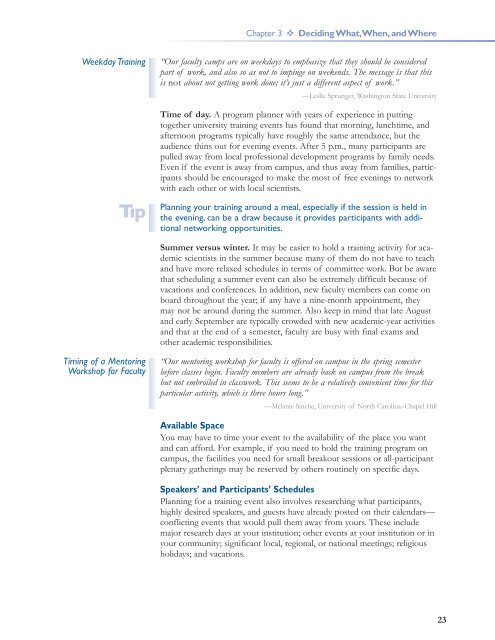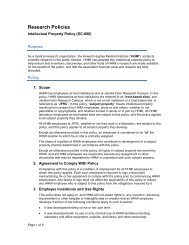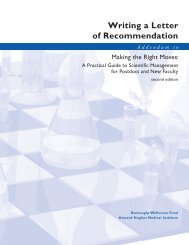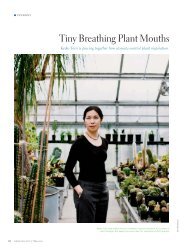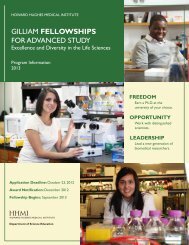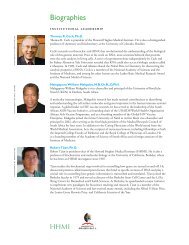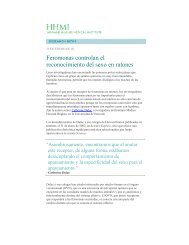Training Scientists to Make the Right Moves - Howard Hughes ...
Training Scientists to Make the Right Moves - Howard Hughes ...
Training Scientists to Make the Right Moves - Howard Hughes ...
Create successful ePaper yourself
Turn your PDF publications into a flip-book with our unique Google optimized e-Paper software.
QA<br />
Chapter 3 Deciding What,When, and Where<br />
Weekday <strong>Training</strong><br />
At a Glance<br />
“Our faculty camps are on weekdays <strong>to</strong> emphasize that <strong>the</strong>y should be considered<br />
part of work, and also so as not <strong>to</strong> impinge on weekends. The message is that this<br />
is not about not getting work done; it’s just a different aspect of work.”<br />
Chapter One<br />
—Leslie Sprunger, Washing<strong>to</strong>n State University<br />
Time of day. A program planner with years of experience in putting<br />
<strong>to</strong>ge<strong>the</strong>r university training events has found that morning, lunchtime, and<br />
afternoon programs typically have roughly <strong>the</strong> same attendance, but <strong>the</strong><br />
audience thins out for evening events. After 5 p.m., many participants are<br />
pulled away from local professional development programs by family needs.<br />
Even if <strong>the</strong> event is away from campus, and thus away from families, participants<br />
should be encouraged <strong>to</strong> make <strong>the</strong> most of free evenings <strong>to</strong> network<br />
with each o<strong>the</strong>r or with local scientists.<br />
Planning your training around a meal, especially if <strong>the</strong> session is held in<br />
<strong>the</strong> evening, can be a draw because it provides participants with additional<br />
networking opportunities.<br />
Summer versus winter. It may be easier <strong>to</strong> hold a training activity for academic<br />
scientists in <strong>the</strong> summer because many of <strong>the</strong>m do not have <strong>to</strong> teach<br />
and have more relaxed schedules in terms of committee work. But be aware<br />
that scheduling a summer event can also be extremely difficult because of<br />
vacations and conferences. In addition, new faculty members can come on<br />
board throughout <strong>the</strong> year; if any have a nine-month appointment, <strong>the</strong>y<br />
may not be around during <strong>the</strong> summer. Also keep in mind that late August<br />
and early September are typically crowded with new academic-year activities<br />
and that at <strong>the</strong> end of a semester, faculty are busy with final exams and<br />
o<strong>the</strong>r academic responsibilities.<br />
Timing of a Men<strong>to</strong>ring<br />
Workshop for Faculty<br />
“Our men<strong>to</strong>ring workshop for faculty is offered on campus in <strong>the</strong> spring semester<br />
before classes begin. Faculty members are already back on campus from <strong>the</strong> break<br />
but not embroiled in classwork. This seems <strong>to</strong> be a relatively convenient time for this<br />
particular activity, which is three hours long.”<br />
—Melanie Sinche, University of North Carolina–Chapel Hill<br />
Available Space<br />
You may have <strong>to</strong> time your event <strong>to</strong> <strong>the</strong> availability of <strong>the</strong> place you want<br />
and can afford. For example, if you need <strong>to</strong> hold <strong>the</strong> training program on<br />
campus, <strong>the</strong> facilities you need for small breakout sessions or all-participant<br />
plenary ga<strong>the</strong>rings may be reserved by o<strong>the</strong>rs routinely on specific days.<br />
Speakers’ and Participants’ Schedules<br />
Planning for a training event also involves researching what participants,<br />
highly desired speakers, and guests have already posted on <strong>the</strong>ir calendars—<br />
conflicting events that would pull <strong>the</strong>m away from yours. These include<br />
major research days at your institution; o<strong>the</strong>r events at your institution or in<br />
your community; significant local, regional, or national meetings; religious<br />
holidays; and vacations.<br />
23


